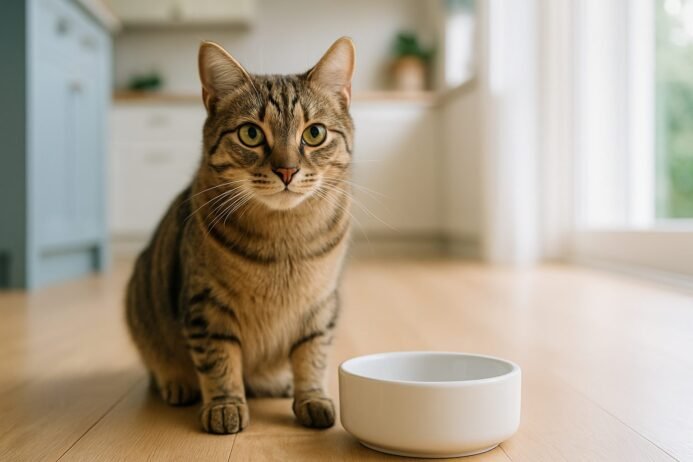How Often Should I Feed My Cat?
- 22 September 2025
- BuyAPet Editorial Team
- All Cats, Cat Health
How Often Should I Feed My Cat?
From tiny kittens to wise seniors, here’s how often to feed your cat, how much to give, and how to keep them healthy and happy.

Quick Answer
Kittens: 3–4 small meals daily.
Adults (1–7 years): 2 meals daily.
Seniors (7+): 2–3 smaller meals, depending on health and appetite.
Stick to a consistent routine, and adjust based on your cat’s weight, activity, and vet recommendations.
Feeding Schedules by Life Stage
| Life Stage | How Often | Notes |
|---|---|---|
| Kittens (8–16 weeks) | 4 meals/day | High-calorie kitten food; small, frequent meals |
| Kittens (4–12 months) | 3 meals/day | Transition toward adult schedule by 12 months |
| Adults (1–7 years) | 2 meals/day | AM & PM; measure total daily allowance |
| Seniors (7+ years) | 2–3 meals/day | Smaller, easier-to-digest portions; monitor weight |
How Much Should I Feed?
- Check the feeding guide on your cat food bag or tin.
- Weigh food for accuracy rather than using scoops.
- Adjust for treats—keep them under 10% of daily calories.
- Monitor your cat’s weight monthly and adjust as needed.
Building a Routine
- Pick meal times that suit your day and keep them consistent.
- Split the total daily food allowance between meals.
- Feed in a quiet area, away from noise and other pets.
- Wash bowls daily to keep food safe and appealing.
- Weigh your cat monthly and tweak food amounts slightly if needed.
FAQs
Can I leave dry food out all day?
It’s better to measure daily portions to avoid overeating. Some cats do well with puzzle feeders or timed dispensers for enrichment.
What about feeding late at night?
Cats are naturally active at dawn and dusk. An evening feed can work well if you keep meal timings consistent.
Should I change feeding when my cat is neutered?
Yes, neutered cats may need slightly fewer calories. Reduce portions a little and watch their weight closely.
Can older cats eat kitten food?
Only if advised by your vet. Seniors benefit more from food designed for older cats with added joint and kidney support.
